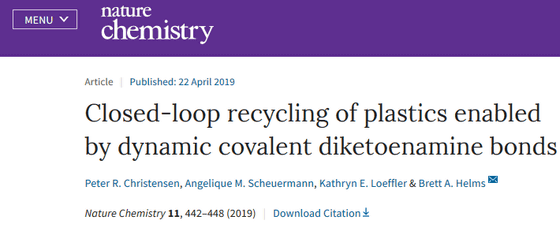Researchers develop new plastics that are easy to recycle

by
When plastic is recycled, impurities remain or the properties of the polymer (polymer) deteriorate. In order to improve these problems, researchers have developed 'new-generation plastics' that are easy to recycle.
Closed-loop recycling of plastics enabled by dynamic covalent diketonamine bonds | Nature Chemistry
https://www.nature.com/articles/s41557-019-0249-2

New type of plastic is a recycling dream | Ars Technica
https://arstechnica.com/science/2019/04/new-type-of-plastic-is-a-recycling-dream/
Plastics are polymers with a repeating structure in which monomers (monomers) are polymerized, and if they are recycled, impurities remain and the properties of the polymer deteriorate, resulting in a lower quality than before recycling. On the other hand, if you make plastic by reversible polymerization, you should be able to promote recycling because you can recover the monomer, but the recovery of the monomer costs both energy and money.
Next-generation plastics developed by Professor Peter R. Christensen and others at Lawrence Berkeley National Laboratory are polymerizing through a dynamically shared diketone amine bond. This polymer (diketone amine) is produced from a wide range of triketones and aromatic or aliphatic amines, and the only by-product is water.
And at the time of recycling, instead of melting plastic at high temperature as before, monomer can be recovered from among additives by dissolving it with strong acid. The performance of the monomer is the same and can be reworked into the same polymer. Also, due to this difference in properties, even if multiple plastics are mixed, it is possible to dissolve and recover only the next-generation plastic with a strong acid.
It is only possible to recycle what you no longer need as resources. The spread of next-generation plastics is also awaited for ease of recycling.
Related Posts:
in Science, Posted by logc_nt







